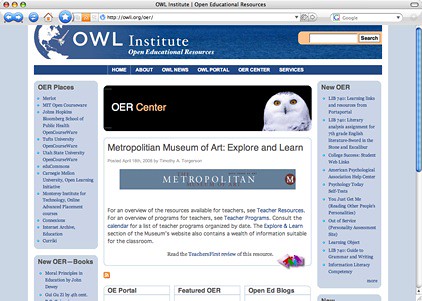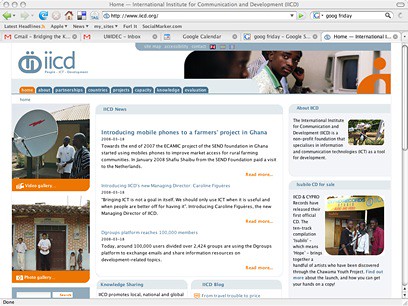In May 2005, the member states of the Council of Europe formally recognised that information and communication technologies (ICTs) are a driving force in building the Information Society and have brought about a convergence of different communication mediums. They also recognised that ICTs can offer a wider range of possibilities in exercising human rights, and therefore that limited or no access to ICTs can deprive individuals of the ability to exercise fully their human rights. The “
Declaration of the Committee of Ministers on human rights and the rule of law in the Information Society” captured this in a series of statements.
That was over three years ago. So how much of this has filtered into policies and strategies? I guess these things take a long time, but with ICTs, one year is a very long time. So that we don't lose sight of what that important document said, here is a brief summary of each statement.
I. Human rights in the Information Society1. The right to freedom of expression, information and communicationICTs provide unprecedented opportunities for all to enjoy freedom of expression. However, ICTs also pose many serious challenges to that freedom, such as state and private censorship. Member states should promote, through appropriate means, interoperable technical standards in the digital environment, including those for digital broadcasting, that allow citizens the widest possible access to content.
2. The right to respect for private life and correspondenceMember states should promote frameworks for self- and co-regulation by private sector actors with a view to protecting the right to respect for private life and private correspondence. A key element of the promotion of such self- or co-regulation should be that any processing of personal data by governments or the private sector should be compatible with the right to respect for private life, and that no exception should exceed those provided for in Article 8, paragraph 2, of the ECHR, or in Article 9, paragraph 2, of the Convention for the Protection of Individuals with regard to Automatic Processing of Personal Data.
3. The right to education and the importance of encouraging access to the new information technologies and their use by all without discriminationMember states should facilitate access to ICT devices and promote education to allow all persons, in particular children, to acquire the skills needed to work with a broad range of ICTs and assess critically the quality of information, in particular that which would be harmful to them.
4. The prohibition of slavery and forced labour, and the prohibition of trafficking in human beingsMember states should maintain and enhance legal and practical measures to prevent and combat ICT-assisted forms of trafficking in human beings.
5. The right to a fair trial and to no punishment without lawMember states should promote codes of conduct for representatives of the media and information service providers, which stress that media reporting on trials should be in conformity with the prescriptions of Article 6 of the ECHR. They should also consider whether there is a need to develop further international legal frameworks on jurisdiction to ensure that the right to no punishment without law is respected in a digital environment.
6. The protection of propertyIntellectual property rights must be protected in a digital environment, in accordance with the provisions of international treaties in the area of intellectual property. At the same time, access to information in the public domain must be protected, and attempts to curtail access and usage rights prevented.
Member states should provide the legal framework necessary for the above-mentioned goals. They should also seek, where possible, to put the political, social services, economic, and research information they produce into the public domain, thereby increasing access to information of vital importance to everyone. In so doing, they should take note of the Council of Europe's Convention on Cybercrime, in particular Article 10, on offences related to infringements of copyright and related rights.
7. The right to free electionsMember states should examine the use of ICTs in fostering democratic processes with a view to strengthening the participation, initiative, knowledge and engagement of citizens, improving the transparency of democratic decision making, the accountability and responsiveness of public authorities, and encouraging public debate and scrutiny of the decision-making process. Where member states use e-voting, they shall take steps to ensure transparency, verifiability and accountability, reliability and security of the e-voting systems, and in general ensure their compatibility with Committee of Ministers' Recommendation Rec(2004)11 on legal, operational and technical standards for e-voting.
8. Freedom of assemblyMember states should adapt their legal frameworks to guarantee freedom of ICT-assisted assembly and take the steps necessary to ensure that monitoring and surveillance of assembly and association in a digital environment does not take place, and that any exceptions to this must comply with those provided for in Article 11, paragraph 2, of the ECHR.
II. A multi-stakeholder governance approach for building the Information Society: the roles and responsibilities of stakeholdersBuilding an inclusive Information Society, based on respect for human rights and the rule of law, requires new forms of solidarity, partnership and cooperation among governments, civil society, the private sector and international organisations. Through open discussions and exchanges of information worldwide, a multi-stakeholder governance approach will help shape agendas and devise new regulatory and non-regulatory models which will account for challenges and problems arising from the rapid development of the Information Society.
1. Council of Europe member statesTaking full account of the differences between services delivered by different means and people's expectations of these services, member states, with a view to protecting human rights, should promote self- and co-regulation by private sector actors to reduce the availability of illegal and of harmful content and to enable users to protect themselves from both.
2. Civil societyAt a trans-national level, civil society is urged to cooperate in the sharing of objectives, best practice and experience with respect to expanding the opportunities held by the Information Society.
3. Private sectorPrivate sector actors are urged to play a role in upholding and promoting human rights, such as freedom of expression and the respect of human dignity. This role can be fulfilled most effectively in partnership with governments and civil society.
4. The Council of EuropeThe Council of Europe will raise awareness of and promote accession to the Convention on Cybercrime and its Additional Protocol, and the Convention for the Protection of Individuals with regard to Automatic Processing of Personal Data, on a worldwide basis. The Convention Committee will monitor the implementation of these conventions and their additional protocols and will, if need be, propose any amendments.
The complete document can be found at
https://wcd.coe.int/ViewDoc.jsp?id=849061






 Vice Chancellor of the University, Professor Nigel Harris formally launched the Open Campus during an official news conference with the international, regional and local media on Wednesday, July 2, 2008.
Vice Chancellor of the University, Professor Nigel Harris formally launched the Open Campus during an official news conference with the international, regional and local media on Wednesday, July 2, 2008.










